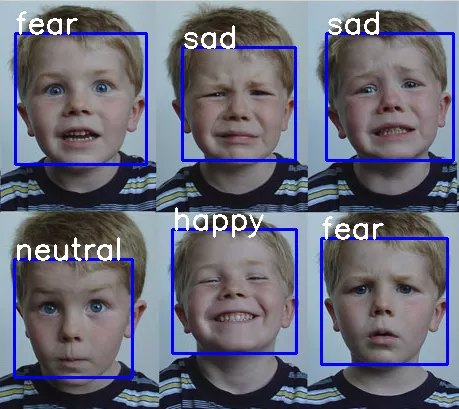转载:https://sefiks.com/2018/01/01/facial-expression-recognition-with-keras/
基于上次的内容,这节内容主要介绍如何利用摄像头进行实时的人脸表情识别。
(1)首先实时的检测出人脸,然后把检测出的人脸截取下来送到模型中去做判别。这里检测人脸用到了opencv中自带的人脸检测器
import cv2 face_cascade = cv2.CascadeClassifier('C:/ProgramData/Anaconda3/envs/tensorflow/Library/etc/haarcascades/haarcascade_frontalface_default.xml') img = cv2.imread('/data/friends.jpg') gray = cv2.cvtColor(img, cv2.COLOR_BGR2GRAY) #transform image to gray scale faces = face_cascade.detectMultiScale(gray, 1.3, 5) for (x,y,w,h) in faces: #print(faces) cv2.rectangle(img,(x,y),(x+w,y+h),(255,0,0),2) cv2.imshow('img',img)
(2)上边是检测静态图片的,检测实时检测人脸的方式是:
cap = cv2.VideoCapture(0)
while cap.isOpened: ret,img = cap.read() #转化为灰色图片 gray = cv2.cvtColor(img,cv2.COLOR_BGR2GRAY) #检测人脸 faces = face_cascade.detectMultiScale(gray,1.3,5) #框出人脸 for (x,y,w,h) in faces: cv2.rectangle(img,(x,y),(x+w,y+h),(0,255,0),2)
cv2.imshow("camera", img)
if cv2.waitKey(30) & 0xFF == ord('q'):
break
cap.release()
cv2.destroyAllWindows()
(3)检测出人脸后,我们能够得到人脸的上下左右坐标,然后根据坐标可截取到人脸。然后把截取到的人脸转变为48*48的大小。
detected_face = img[int(y):int(y+h), int(x):int(x+w)] #crop detected face detected_face = cv2.cvtColor(detected_face, cv2.COLOR_BGR2GRAY) #transform to gray scale detected_face = cv2.resize(detected_face, (48, 48)) #resize to 48x48
(4)表情识别,首先加载训练好的模型和权重
from keras.models import model_from_json model = model_from_json(open("facial_expression_model_structure.json", "r").read()) model.load_weights('facial_expression_model_weights.h5') #load weights
(5) 然后进行识别
img_pixels = image.img_to_array(detected_face) img_pixels = np.expand_dims(img_pixels, axis = 0) img_pixels /= 255 predictions = model.predict(img_pixels) #find max indexed array max_index = np.argmax(predictions[0]) emotions = ('angry', 'disgust', 'fear', 'happy', 'sad', 'surprise', 'neutral') emotion = emotions[max_index] cv2.putText(img, emotion, (int(x), int(y)), cv2.FONT_HERSHEY_SIMPLEX, 1, (255,255,255), 2)
实验结果:
